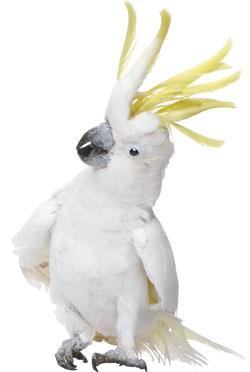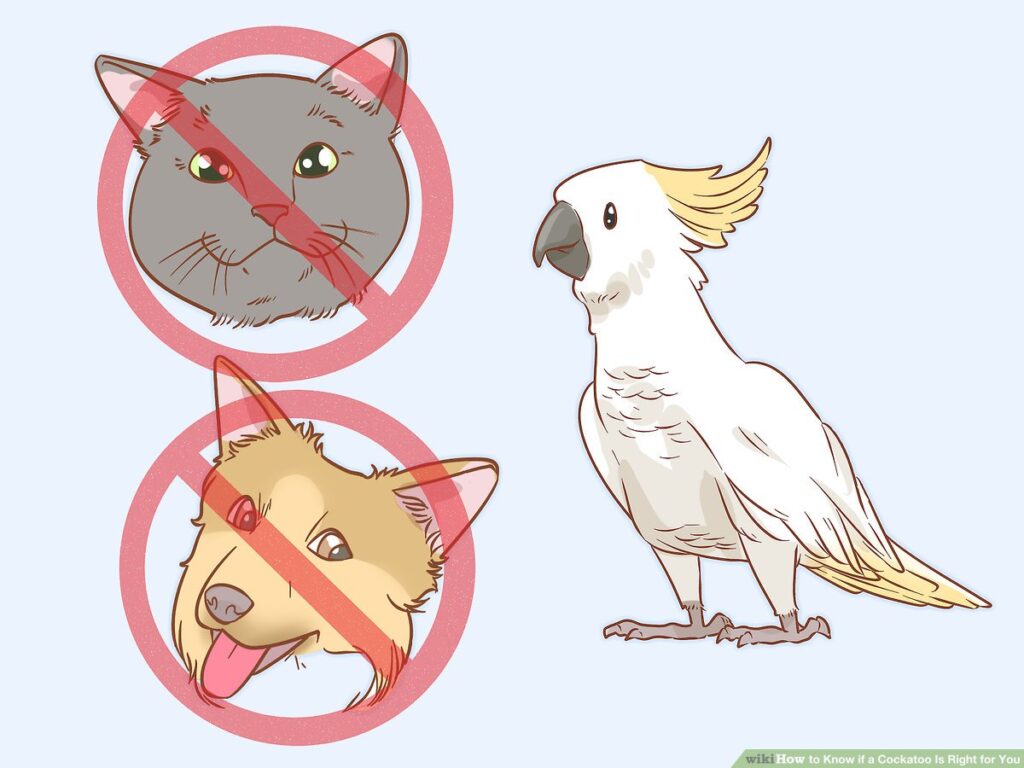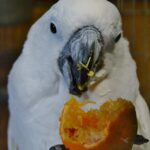Ownership of a cockatoo generally requires a license, particularly in countries with strict wildlife regulations. Laws vary by location, so local guidelines should be checked.
Owning a cockatoo is a significant responsibility that may be subject to legal restrictions depending on your geographic area. These charismatic and intelligent birds are not just a pet, but a long-term commitment, as they can live for 50 years or more with proper care.
Ensuring you have the necessary license protects both you and the bird by conforming to wildlife conservation efforts and pet ownership laws. Before considering a cockatoo as a pet, it’s essential to research your country’s specific requirements. This might include obtaining a license or permit, alongside providing an environment that suits their social and mental needs. Responsible ownership starts with understanding and complying with these regulations, which helps preserve the species and ensures a safe, happy home for your feathered friend.
The Beauty Of Cockatoos
Cockatoos are a delight for bird enthusiasts. Their striking features and vibrant personalities make them cherished pets. People often admire these birds for their majestic plumes and sociable nature.
Distinct Features Of These Feathered Companions
Cockatoos stand out with their expressive crests and curved beaks. Their crests can tell you a lot about their mood. When excited or curious, their crests will rise. These birds also boast a variety of color patterns. Their feathers can range from snowy white to deep black, often with surprising splashes of color.
- Long lifespan – some live past 60 years
- Loud calls – their natural vocalizations carry for miles
- Social behavior – they enjoy interaction and group activities
Popular Cockatoo Species For Pet Lovers
Cockatoos come in a variety of species, each with unique traits that attract pet owners.
| Species Name | Color | Size | Personality Traits |
|---|---|---|---|
| Umbrella Cockatoo | White | Medium | Affectionate and Energetic |
| Sulphur-crested Cockatoo | White with Yellow Crest | Large | Confident and Vocal |
| Goffin’s Cockatoo | White with Pink Tints | Small | Intelligent and Playful |
| Palm Cockatoo | Black with Red Cheeks | Large | Proud and Powerful |
Choosing the right cockatoo depends on space, time, and lifestyle. Each species requires specific care and attention. Prospective owners should consider these aspects before bringing a cockatoo into their home.

Credit: agriculture.vic.gov.au
Legal Considerations For Cockatoo Ownership
Exploring the realm of exotic pets brings us to the delightful and charismatic cockatoo. These parrots captivate with their intelligence and vibrant personalities. But amidst the enjoyment, a responsible future cockatoo owner must navigate the legal landscape. Owning one of these birds isn’t a simple impulse buy. It requires understanding the intricate legal considerations.
Understanding Pet Bird Regulation
Before welcoming a cockatoo into your home, it’s crucial to grasp the laws around pet bird ownership. Each country has its own set of rules governing the sale, breeding, and keeping of exotic birds. For instance, in the United States, the Wild Bird Conservation Act (WBCA) and the Convention on International Trade in Endangered Species of Wild Fauna and Flora (CITES) play significant roles.
- WBCA and CITES aim to protect exotic birds like cockatoos.
- They control international trade and ownership.
- Licensing may be required from government wildlife agencies.
State And Local Legislation Variances
Beyond federal laws, state and local regulations can differ dramatically. A cockatoo that’s legal in one area may be restricted in another. Prospective owners need to check with state wildlife agencies or local government offices for applicable rules.
| State | Permit Required | Restrictions |
|---|---|---|
| California | Yes | Some species banned |
| Florida | No | Must follow cage size guidelines |
| Michigan | Varies | Local bans possible |
Remember to always verify the latest regulations as laws can change. Seek expert advice if in doubt. Failure to comply can lead to legal problems, including fines or losing the right to keep your pet.
Licensing Requirements For Exotic Pets
Owning an exotic pet like a cockatoo involves knowing the law. In some places, a license is necessary to own exotic pets. These regulations help protect both the animals and community. Different countries and states have different rules. Checking local laws is essential before bringing a cockatoo home.
Navigating Federal Laws
Federal laws govern exotic pet ownership in many countries. In the U.S., the Animal Welfare Act sets standards for care and treatment. The Endangered Species Act can also affect cockatoo ownership. Owners must ensure they comply with these federal regulations.
The Role Of The Cites Permit
The Convention on International Trade in Endangered Species of Wild Fauna and Flora (CITES) plays a crucial role. This international agreement regulates the trade of exotic animals. Cockatoos, often endangered, may require a CITES permit. This permit is needed for both importing and owning some species of cockatoo.
| Requirement | Description |
|---|---|
| Licensing | Potential need based on local laws. |
| Federal Compliance | Mandatory adherence to federal laws. |
| CITES Permit | Required for endangered species. |
- Check local laws for license requirements.
- Understand federal laws affecting pet ownership.
- Consider whether a CITES permit is needed.
Remember, having a cockatoo is a serious commitment. Proper research and adherence to laws ensure a happy life for your feathered friend.

Credit: www.facebook.com
Specific Cockatoo Considerations
When contemplating the ownership of a cockatoo, you must consider more than just companionship. These majestic birds come with specific needs and legal considerations. Understanding these complexities before bringing a cockatoo into your home is vital. Let’s delve into the specifics.
Conservation Status
Many cockatoo species face threats in the wild. This leads to varied conservation statuses for each species. Some species thrive, others struggle. Cockatoos’ survival can depend on habitat conservation efforts and strict trade regulations. Becoming a cockatoo guardian implies responsibility towards their species’ future.
Impact Of Being An Endangered Species
- Strict Regulations: Legal ownership demands adherence to laws protecting cockatoos.
- Permits Required: Depending on location and species, permits for ownership may be necessary.
- Responsible Breeding: Owners should ensure their actions do not harm the population.
In regions with stringent rules, owning an endangered cockatoo may need a special license. Authorities aim to prevent illegal trading. These protective measures ensure the birds’ survival in the wild.
Do Your Homework: Research Before You Own
Embarking on the journey of owning a cockatoo requires research. These exotic birds are not only beautiful but come with a unique set of requirements. It’s not just about providing a spacious cage or a variety of foods. Potential owners must delve into the laws governing cockatoo ownership. It’s crucial to understand if a license is necessary in your area or if there are restrictions on keeping such a pet. Let’s explore how you can prepare for bringing a cockatoo into your life.
Benefits Of Joining Bird Enthusiast Groups
- Networking with experienced owners who can share their insights.
- Access to exclusive resources and tools for cockatoo care.
- Opportunities to attend workshops and seminars on bird health and behavior.
- Support systems for troubleshooting common issues with your cockatoo.
Educational Resources And Expert Advice
Gathering knowledge is key. Vet-approved guides and reputable websites offer a wealth of information. Local libraries may have books about cockatoo care. Seek advice from avian vets who specialize in birds. They can provide you with all you need to know about cockatoo health and wellbeing.
| Type of Resource | Description | Where to Find |
|---|---|---|
| Books | Detailed cockatoo care guidelines | Libraries, bookstores |
| Online Forums | Real-time advice from cockatoo owners | Web communities |
| Avian Vets | Professional health care tips | Veterinary Clinics |

Credit: be.chewy.com
Preparing For A Cockatoo
Embarking on the journey of owning a cockatoo requires thorough preparation. These vibrant birds are not just pets, but companions that need a loving and well-prepared environment. Before deciding to welcome a cockatoo into your home, it’s essential to understand the commitment and setup needed to ensure their happiness and health.
Setting Up A Suitable Habitat
A cockatoo’s habitat is more than just a cage; it’s their personal space where they feel safe and comfortable. Here’s how to create the perfect home:
- Select a spacious cage that allows your cockatoo to stretch and exercise with ease.
- Place the cage in a lively area of your home to keep your bird engaged.
- Equip the habitat with various perches of different sizes to support foot health.
- Include toys and puzzles that cater to their intelligent and curious nature.
- Ensure a steady supply of fresh water and a diet rich in variety.
- Install proper lighting or provide natural light to regulate your cockatoo’s biological clock.
Long-term Commitment And Care
Owning a cockatoo is like adding a new member to your family. Understand the lifelong dedication:
- Cockatoos have long lifespans, often exceeding 50 years.
- They require daily social interaction and mental stimulation.
- Consistent grooming practices, such as trimming nails and wings, are necessary.
- Be prepared for veterinary visits and check-ups to keep your cockatoo healthy.
- Consider a pet insurance plan to manage potential healthcare costs.
- Understand their unique vocalizations and behaviors to communicate effectively.
By adhering to these guidelines, you’ll create a loving environment where your cockatoo can thrive. Remember, a happy cockatoo is a healthy cockatoo!
Alternatives To Licensing
Not all places require a license to own a cockatoo. But, what if you can’t get one? Don’t worry! Other ways exist to share life with these feathered friends without going through the licensing process. Here’s a look at some loving alternatives.
Adoption Through Rescues
Many cockatoos need homes. Some were given up by previous owners. Others might have been rescued from less-than-ideal situations. Rescue centers often have strict adoption procedures. This ensures birds go to the right homes. Below are steps to adopt from rescues:
- Find a reputable bird rescue center.
- Complete their adoption application.
- Undergo a home visit check.
- Meet available cockatoos.
- Choose a bird that fits with your family.
- Finalize adoption papers.
Fostering Opportunities
Fostering is another fantastic alternative.Foster parents provide temporary homes for cockatoos. This helps the birds get used to a home environment. It also gives them love and care they might have missed. Plus, it’s less of a long-term commitment than adopting outright. Here’s how to become a foster parent for cockatoos:
- Contact local avian rescues for fostering programs.
- Express your interest in fostering a cockatoo.
- Fill out a fostering application form.
- Prepare your home for a feathery guest.
- Agree to care for the bird until adoption.
Advocacy And Ethical Ownership
Welcome to the vital discussion on the ethical ownership of cockatoos. These majestic birds are not just pets. They are lifelong companions that require a deep commitment. Before considering a cockatoo for your family, understand the importance of responsible ownership. It protects both the well-being of the bird and the ecosystem.
Promoting Responsible Pet Ownership
Cockatoos need more than a cage. They crave attention, space, and stimulation. As a potential owner, educating yourself on their needs is crucial. This commitment extends beyond basic care. Responsible pet ownership involves:
- Regular health check-ups with an avian vet.
- Understanding cockatoo behavior and social needs.
- Ensuring a proper diet tailored for cockatoos.
- Providing enrichment activities to keep them engaged.
Combating Illegal Bird Trade
The illegal bird trade is a dark reality. It poses a serious threat to cockatoos’ survival. To combat this, follow these steps:
- Demand proof of legality. Ask for documents when you buy a cockatoo.
- Support conservation efforts working to protect wild populations.
- Report any suspicious activities related to wildlife trade to authorities.
Your actions make a difference. By choosing ethical ownership, you help end illegal trade.
Final Considerations Before Decision
Making the choice to own a cockatoo is exciting. You’ve learned about licenses. Now, let’s talk about money and health care for your bird. Think carefully. Owning a cockatoo takes commitment.
Cost Implications
Cockatoos are not cheap. You’ll pay for more than just the bird. Think about cages, toys, and food. That’s just the start.
- Initial cost: Price can be high. It’s different for each kind of cockatoo.
- Upkeep: Regular expenses add up. Budget for them monthly.
- Unexpected costs: Surprises happen. Be ready for sudden expenses.
A simple table shows yearly costs you might face. Times are by 10 to get a decade’s spend.
| Item | Yearly Cost |
|---|---|
| Food | $300 |
| Toys | $100 |
| Cage | $200 |
| Vet Visits | $250 |
| Emergencies | $500+ |
| Total | $1350+ |
Appointment Of Exotic Pet Veterinarian
Find a vet that knows about birds. A vet for exotic pets is a must. Cockatoos need special care.
- Research vets with good reviews.
- Ask other cockatoo owners for advice.
- Visit the clinic. See if it’s clean and safe.
- Meet the vet. Trust is key for your bird’s health.
Plan ahead for health. Cockatoos live long. They will need a vet many times.
Conclusion
Securing a license is a critical step for aspiring cockatoo owners. It ensures the welfare of these remarkable birds and aligns with legal requirements. Remember, before bringing a cockatoo home, check your local wildlife regulations. Embrace responsible ownership and enjoy the unique companionship a cockatoo offers with the proper permissions in place.
Ryan Everhart is a passionate bird enthusiast and blogger, primarily writing on his website, Avian Whispers. His journey into the world of bird blogging began with a deep interest in parrots, a species that captivated his attention for their intelligence and social behavior. Over time, his content expanded to cover a broader range of bird species, offering insights into bird behavior, care, habitats, and conservation.
Ryan is dedicated to educating his audience, which includes both new bird owners and seasoned enthusiasts. His writing is filled with personal experiences, expert knowledge, and practical advice on bird care. Through Avian Whispers, he aims to foster a deeper appreciation for birds, emphasizing their role in nature and the joys of having them as pets.
Starting with articles focused on parrots, Ryan’s work now encompasses a diverse range of topics such as feeding, training, habitat enrichment, and bird health. His love for birds extends beyond parrots, diving into various avian species. His informative and heartfelt writing reflects his commitment to the well-being of birds and the desire to help others connect with these creatures.
As a growing voice in the bird blogging community, Ryan strives to provide a platform where bird lovers can learn, share experiences, and connect over a shared passion for avian life. His blogs are not only educational but also serve as a reminder of the importance of protecting and nurturing the bond between humans and birds.




